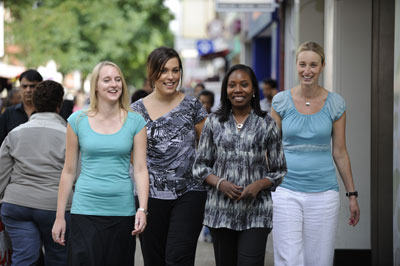
Kirsty McGregor meets the high flying graduates on the Step Up scheme looking for the fast route into a social work career
When then-children’s secretary Ed Balls announced a scheme to fast-track high-flying graduates into social work in 2009, critics branded it an inadequate response to the skills crisis in child protection.
Many questioned the wisdom behind the programme, Step Up to Social Work, asking how employers could hope to attract qualified lawyers and teachers into a profession dogged by negative media coverage.
But the project was inundated with thousands of enquiries: in London there were 20 applications for every place. This month, the first intake of 200 graduates began the employment-based course – complete with a £15,000 salary – to re-train as children’s social workers in eight areas across England.
West London’s 18-month course began on 10 September, with training for the 33 successful candidates driven by local councils. The first six weeks will be spent on academic theory provided by tutors at Hertfordshire University, with one day set aside every two weeks for students to spend time with allocated frontline teams.
After that the students’ time will be split between academic learning and direct work with children and families.
“Our social work staff will back the academic content up with real case examples,” says Kati Maskell, learning and development manager for Hammersmith and Fulham Council. “So the theory learned in the classroom is put into practice immediately.”
The course is split into three placements of four to five months each. In the first and second placements, students work in a children’s centre or children’s home and look at issues facing parents, such as mental health and substance misuse.
“At that point the course will be teaching things like attachment theory and the influence parents have on children’s development,” says Maskell.
The students will spend three days a week at university during the first placement, two during the second and none during the final placement, which is spent with their allocated frontline teams.
At the end of the course, it is hoped each student will stay within their team – or at the very least within west London. Local authorities in the area, like many throughout the UK, have been experiencing difficulties in recruiting and retaining children’s social workers.
“Although the situation is not as acute as it was, there is still movement and churn,” says Chris Hogan, assistant director of children’s services at Hounslow Council.
“The problems centre around filling posts in frontline teams, such as children in care teams, court teams and safeguarding teams.”
The West London Alliance – consisting of six boroughs including Hammersmith and Fulham and Hounslow – had already begun working with higher education institutions (HEIs) to address this, so the Step Up scheme fell on fertile ground.
Hogan admits she was sceptical about the timescales at first, but soon realised Step Up could provide a fresh approach to retaining children’s social workers.
“We looked at Step Up and saw a lot that linked into the things we’d identified, such as the need for employers to know what they want from students at the end of the degree,” she says.
One of the biggest draws of the scheme, she says, was the opportunity for employers to have a say in designing the curriculum, under the auspices of Salford University. Hertfordshire was then commissioned to deliver the academic content.
“To get what we want from students at the end of the degree we need to select bright, competent people with resilience and good analytical skills – and then offer them the opportunity to learn what they need to in the workplace at the same time as having a good curriculum,” says Hogan.
Employers were also attracted by the opportunity to have a say in the rigorous selection process, which comprised online screening and an assessment centre.
“From an employer point of view it was great,” says Maskell. “We wanted service users to be involved and to test students’ written skills, and we had that input into the assessment centres. We saw some strong candidates.”
Hogan agrees. “Requiring somebody to have a 2:1 means you’ve already ascertained there’s an academic ability there, but these students are a different calibre altogether.”
The students
(l-r Kati Maskell, Amy Puncheon, Yasmin Amer and Velma Simeon.)
“I did a law degree, then the one-year training to be a barrister. After that I worked as a paralegal for a family law firm that specialises in public child law, so social workers were involved in my day-to-day work.
“We were dealing with kids going through adoption, foster care and abuse cases. It struck a chord with me and I realised I was more interested in social work than the legal side.
“The Step Up scheme was the perfect way of pursuing social work without having to pay for a two-year course. That wouldn’t have been economically feasible for me.
“Also, the fact that it’s employment-based is so attractive; at the end of it, I will go into a job having had experience of working and studying at the same time. That will make me more confident.”
Amy Puncheon, (left, above) sociology graduate
“I worked with children and young people while I was doing a sociology degree and, when I graduated, I gained a job with Portsmouth youth offending team as an unqualified social worker.
“So I’ve been working alongside social workers for the past year and loved it. I found Step Up on the internet and was drawn to the fact that we’re going to do a statutory child protection placement. That’s going to be invaluable later on when it comes to getting jobs. And it’s focused on children and young people, rather than a course at university which can span adult services or mental health.
“I was concerned about the workload. But that is outweighed by the experience you gain.”
The learning guide
Velma Simeon, the learning guide for Step Up students, is responsible for identifying opportunities for learning on the students’ behalf. Based at Hammersmith and Fulham Council, she meets the students and their team managers twice a term to find out what skills they need to gain or if they are having any difficulties. She also has a social work caseload herself.
“We know what the students are learning throughout their course, so we can see to it that they get relevant experience within their placements,” says Simeon.
Simeon has previous experience as a practice educator, but she saw this role as a unique opportunity to teach students about the day-to-day processes of social work.
“Students often leave university without having worked directly with children,” she says. “With this route they will have the opportunity to go in and work with a family or child and see it through to the end.”
Step up facts
●The scheme is running in Manchester, Merseyside, Yorkshire and Humberside, West Midlands, East Midlands, Bedfordshire and Luton, East of England, and West London.
● Students receive a bursary of at least £15,000 a year.
● They must have a minimum 2:1 degree, GCSEs in maths and English and experience of working with children and young people.
● The course lasts around 18 months, depending on the individual’s experience.
● Training leads to a General Social Care Council-approved Masters degree in social work.
● The scheme is overseen by the Children’s Workforce Development Council.
What do you think? Join the debate on CareSpace
Keep up to date with the latest developments in social care Sign up to our daily and weekly emails
This article is published in the 16 September issue of Community Care magazine under the heading On the fast track to a new career

 Sara Sharif case review begins after father and stepmother convicted of murder
Sara Sharif case review begins after father and stepmother convicted of murder 
 Facebook
Facebook X
X LinkedIn
LinkedIn Instagram
Instagram
Comments are closed.